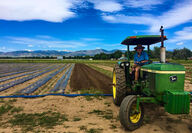Sorted by date Results 1 - 10 of 10

Farming and ranching in the urban interface has unique challenges and opportunities. Boulder County, with roughly one-third of its 740 square miles (157,000 acres of 470,000 acres) on the plains, is home to 330,758 people and 107,043 acres of farms and ranches. This population density is buffered by both land use policies that contain the growth of cities and prevent unincorporated lands from being subdivided into parcels smaller than 35 acres, and by progressive land conservation programs by...
Are you ready to see behind the curtain and understand more about area produce farms? On Aug. 28, join in a bus tour of produce farms in Boulder and Adams Counties ranging from two – 2000 acres, direct to consumer and wholesale, and hear what it takes to help them thrive. CSU Extension, in partnership with Colorado Fruit and Vegetable Growers Association, has queued up a tour of four farms for a full Saturday of exploration. This tour is funded by grant dollars through a Specialty Crops Block Grant award from the Colorado Department of A...

For many of us, the post-Covid return to normal is still largely an aspiration. While most of Colorado is enjoying not having to wear masks in public places and finding socializing readily available, parts of society are grappling with changes in workforce, supply chains, and certainty of plans for "normal" when looking into the future. In May, I outlined how a larger than average snowpack (163% of 30-year snow water equivalent) was a welcome departure from normal for farmers in the South...

In farming and ranching, much depends on the weather. And unlike a business with a roof (apologies to our controlled environment producers who can be immune) there are myriad weather factors our food, feed and fiber producers cannot control. Much of this ongoing column calls out this stark reality, so that readers insulated from it can get reconnected to what it takes to produce and sell food into our modern food system. In this installment, water rules, as it so often does in this semi-arid...

Agriculture in Colorado can be in a state of challenging realities. Like all spots on terrestrial earth, we are surrounded by abundant nitrogen in the air, but we are unable to get this essential nutrient to crops without significant human intervention. Some 70% of the snowpack melts out in 90 days, leaving farmers on the semi-arid plains in search of water from rivers, creeks, aquifers and the sky to replenish soil moisture. Many Coloradans enthusiastically demand local food, yet county, state...

It seems the old Chinese adage (curse?), "May you be born in interesting times," continues to play on from 2020 into 2021. Atop Covid-19, business pivots from farmers markets and foodservice accounts to increased CSA and online sales. Working outdoors in very smoky conditions last summer/fall, and doing their best to keep farm workers safe from both, Boulder County farmers are now staring down a 2021 snowpack in the Indian Peaks portion of the South Platte River watershed that varies from...
When did our world become one of so much risk management? Was it always this way but now the risks are shared among so many? A year of masks and Covid bubbles with a summer and fall of wildfire smoke, we are suddenly, hopefully more united in common foes and the strategies to deal with their impacts. As a subset of the US population, farmers and ranchers are notoriously, ruggedly independent as business operators. Maybe it is the scarcity of the arid ecosystem in the west, but it seems even more so in Colorado than their East coast...

It is a grand understatement to assert that life has been an interesting ride for 2020. Our food system and consumer behaviors during this time have made it through some challenging adjustments and still many Americans are food insecure. As summer fire and smoke abruptly gave way to September freeze advisories, it appeared our Northern Colorado outdoor growing season was coming to an end Sept. 9. But Mother Nature bats last and only low-lying fields suffered cold damage. This was a seasonal fake...
Agricultural risk is an interesting concept to non-farmers. Imagine you are self-employed, and your business is not only highly dependent on the weather, it can be crushed by it. People have various mental models of what they think your business is like, the skills needed to succeed, what the challenges and rewards are for producing food, and how you remain profitable, including where and how you should allocate your resources. While the scientific and policy communities increasingly look to agriculture as a solution to climate change,...

Eating at home more lately? You are not alone. Consumer food demand has pivoted abruptly over the past two months from about 50% of meals consumed outside of the home to virtually none. My experiences early in this shift revealed household purchases stripping local supermarket inventories, leaving shelves bare of produce, meat, eggs, paper products, etc. Trade associations and supply chain experts note there is no major lack of US food supply, aside from some slowdown in meatpacking due to...